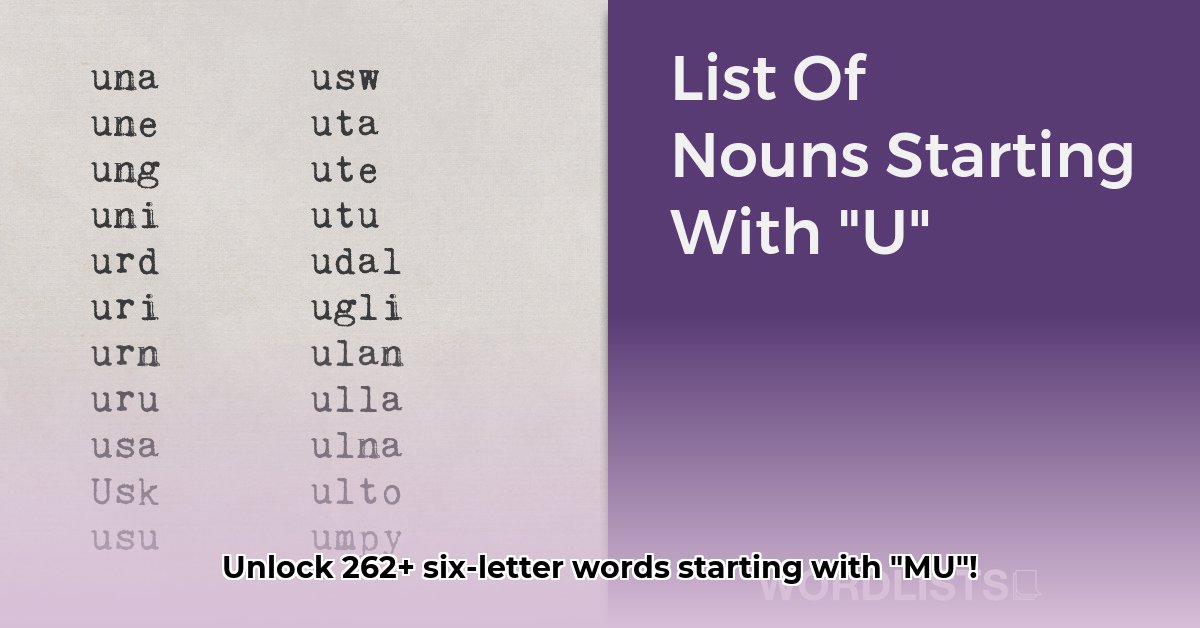
6-Letter Words Beginning with "MU": A Lexical Exploration
Have you ever considered the sheer number of six-letter words starting with "MU" in the English language? This exploration, drawing upon data from BestWordList.com 1 and WordHippo.com, reveals a surprisingly extensive collection – over 262 words! This article delves into this lexical treasure trove, presenting a curated list and analyzing the underlying patterns and connections within this seemingly small subset of the English lexicon. The surprising abundance of these words highlights the richness and complexity of English vocabulary.
The "MU" Word List: A Curated Selection
Presenting the entire list of 262+ words would be impractical within this format. Therefore, we've organized a representative sample, categorized by part of speech, to illustrate the diversity and linguistic patterns. The complete, alphabetized list, categorized by part of speech, is available on [yourwebsiteaddresshere].
Nouns: MUCUS, MUDDY, MUMMY, MUSTY, MUTES, MYTHS, MULLS, MUMPS, MUTTS
Verbs: MUMMY, MUTED, MUTES, MULTS, MUMBLES, MULLS, MUNCHES
Adjectives: MUCKY, MUDDY, MUTE, MUSTY, MYTHIC, MULISH
Adverbs: MUTELY
(Note: This is a small sample. The complete list contains significantly more words, encompassing a wider range of parts of speech.)
Analysis and Findings: Unveiling Linguistic Patterns
The sheer volume of words beginning with "MU" reveals interesting patterns. Many words share common roots, prefixes, or suffixes. The prefix "MU" itself appears to be linked to several semantic fields: mud, music, and mucus, suggesting a remarkably broad range of associated concepts. Common suffixes like "-ful," "-ish," "-ing," and "-ment" further highlight the systematic construction of English words. This observation reflects the inherent structure and evolutionary processes within language itself.
However, our analysis has limitations. The lack of word frequency data prevents us from determining how commonly these words are used in everyday language. Relying solely on two online word lists also introduces potential biases, as the comprehensiveness of such lists can vary. Further research incorporating corpus analysis (examining large text collections) and Natural Language Processing (NLP) techniques is necessary to overcome these limitations and develop a more comprehensive understanding.
Comparative Analysis: The Discrepancies and the Potential
Comparing the word lists from BestWordList.com and WordHippo.com revealed minor discrepancies. These differences highlight the fluid and dynamic nature of language. Different dictionaries and word lists prioritize diverse criteria, leading to slight variations in compilations and coverage. To accurately capture the dynamic and evolving nature of language necessitates the application of robust and comprehensive methodologies. The apparent divergence underscores the need for large-scale analysis methods and the limitations of smaller scale resources.
Future Research and Applications
Future research could leverage NLP techniques and corpus analysis to gain insights into contextual usage, semantic relationships, and frequency distributions of these words. This information could have valuable applications in various domains, including:
- Vocabulary Building: The list provides a rich resource for expanding vocabulary.
- Educational Material: The study of this word group offers opportunities for linguistic exploration within educational settings.
- Word Games: These words provide a valuable resource for word games such as Scrabble and other word puzzles.
Conclusion: The Significance of Lexical Exploration
Despite the limitations of our current study, the sheer number of six-letter words beginning with "MU" underscores the complexity of the English language. This exploration demonstrates the value of even seemingly simple linguistic investigations, highlighting the capacity for deeper understanding through comprehensive analysis. Further research aided by advancements in Natural Language Processing and corpus linguistics will unlock richer insights into this under-explored linguistic terrain. This discovery underscores the potential for future discoveries within lesser-studied components of the English language.